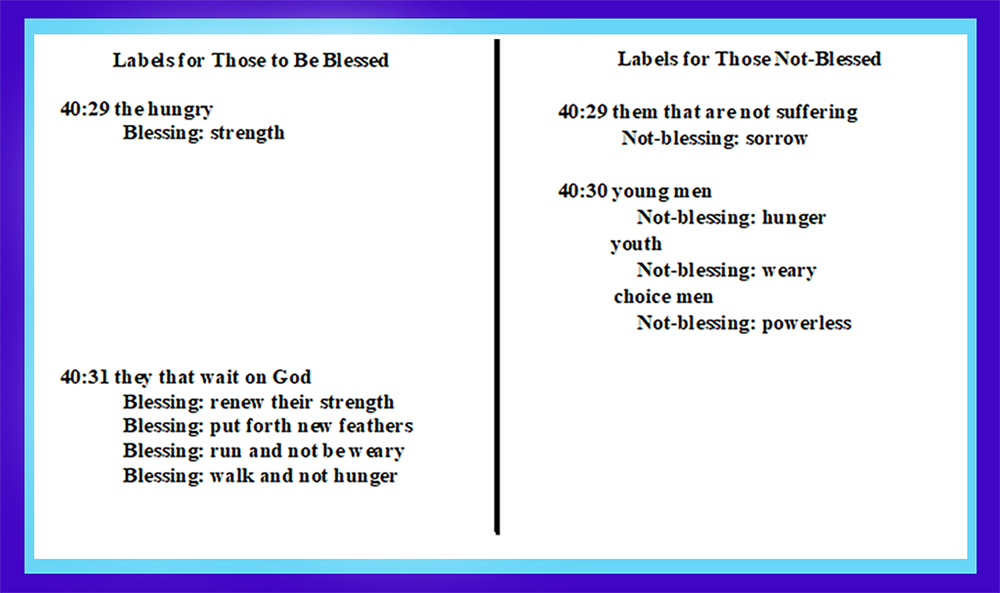Volume Two: Verses Without “Remnant”
The text of Isaiah labels faithful Israel. The last devotional considered verses concerning faithful Israel that contain the Greek word “remnant.” All but one of these occur in Greek Septuagint Isaiah “Volume 1” (Link to prior post). Devotional 2.58 will move forward in examination of how Septuagint Isaiah labels faithful Israel without using the word “remnant.”
Overview
Volume Two of Septuagint Isaiah contains ample quantities of direct speech by God. Up to our present location in Isaiah 54:1 Septuagint, God directs a good portion of his speech to his people. Sometimes he chastises. He often warns. And, God’s words provide a great deal of comfort. Often, God alternates rapidly between words of chastisement and warning and words of comfort and blessing. As asked in previous posts (Isaiah Devotional 60, Isaiah Devotional 2.14), is God schizophrenic? Does he have multiple personalities? Do the frequent changes of tone in God’s speech and intention indicate a supreme being who waffles? Someone who cannot make up his mind? Do these frequent changes indicate uncertainty on God’s part? The thesis of this devotional blog on the Septuagint text of Isaiah is that God addresses differing groups of Israel’s people.
This is not to say that there are hard lines cast in cement between “this group and that group.” Rather, among the totality of ethnic Israel in Isaiah’s day, some people displayed hearts which in the long run sought to obey God, while others remained steadfastly rebellious and hard of heart in their behaviors concerning God. Perhaps one should call these different “kinds” of people, rather than groups of people.
The text of Isaiah labels, or tags, these different kinds of people within the ethnic body of Israel. Readers who observe carefully can distinguish to which sort of Israelite God speaks when he directly addresses his people. His message to each group is distinctly different.
Begin at the Beginning
Volume Two of Septuagint Isaiah speaks comfort to God’s people. The very first words announce this theme.
40:1 Comfort ye, comfort ye my people, saith God. 2 Speak, ye priests, to the heart of Jerusalem; comfort her, for her humiliation is accomplished, her sin is put away: for she has received of the Lord’s hand double the amount of her sins. (Brenton, Septuagint in English, LXE)
This text considers Israel as a whole. It appears to include everyone. Verse 9 adds the additional labels “Zion” and “cities of Juda.” Isaiah indicates no distinctions.
But then, verse 27 indicates a first hint of negativity on the part of God’s people. Not all is roses and sunshine.
40:27 For say not you, O Jacob, and why have you spoken, Israel, saying, My way is hid from God, and my God has taken away my judgement, and has departed? (Brenton, Septuagint in American English)
God then defends himself from these allegations in verse 28. The following three verses contain marvelous promises from God through the mouth of Isaiah his prophet. Note carefully, however, that God does specify with labels who exactly will receive these blessings. Further, he sets up contrasting categories of blessing versus non-blessing. The chart below the verse summarizes these.
40:29 He gives strength to the hungry, and sorrow to them that are not suffering. 30 For the young men shall hunger, and the youths shall be weary, and the choice men shall be powerless: 31 but they that wait on God shall renew their strength; they shall put forth new feathers like eagles; they shall run, and not be weary; they shall walk, and not hunger. (LXE)

These verses demonstrate that God does make distinctions among those whom he chooses to bless or not-bless. Whatever else we may conclude about these categories, we clearly can see the profile of person, and in this case Israelite (verse 27), whom God chooses to bless.
… to be continued
